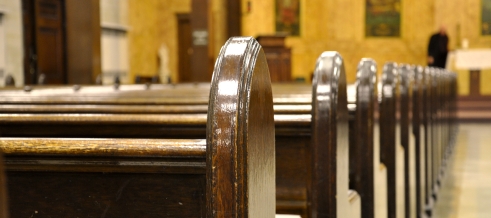
Why Change Now?
- To better catechize and feed the faithful at Mass
- To attract non-practicing Catholics back to Mass
- For Catholics to be able to defend against the Culture of Death
- To better evangelize the world
- To light a fire and create a thirst among Catholics that will inflame a holy passion
- A tool for priests to allow homily preparation easy & more effective
"I never was taught that!"
"Charity" and "forgiveness" are certainly much needed in this world but it seems that these topics are preached about over and over in modern day homilies. On the other hand, sensitive topics from our Church's moral teachings such as "chastity", "homosexuality", "abortion", and "contraception", are merely mentioned sporadically or completely ignored from the pulpit. In the meantime, we are bombarded by images and "lifestyles" from the Culture of Death around every turn. Whether it is coming from the media, Hollywood, or the Internet, the solution is to confront the Culture of Death head on by catechizing the faithful in a systematic, universal way from the pulpit.
Fight the Culture of Death with the Culture of Life
With the state of moral decay in the world and the Culture of Death seemingly taking over the hearts and minds of so many, we feel it is imperative that Catholics know and understand their faith. It is obvious that most Catholics are not in church on Sunday. Why? Because they are not being fed. How will Catholics best be fed (in addition to the primary source, the Sacraments)? By teaching them their faith! This way when Catholics are confronted with a difficult issue, they will know Church teaching, know how best to respond, and know how to protect their families and remain in the state of grace.
Regular church attendees lack basic knowledge of our Catholic faith
When Vatican II introduced a new Liturgical three year Sunday cycle of scripture readings, the priests celebrating Mass were told to comment on the Scriptures, namely to give a homily not a sermon. It requires great wisdom and prudence when correcting one error not to fall into another. Today the vast majority of Catholics below fifty years of age, even those attending Mass regularly, are no longer knowledgeable about their faith. Admittedly they know they are ignorant of some basic teachings of the Church (i.e. morality, God, the Eucharist, our purpose on Earth, what it means to be a man, what it means to be a woman, etc.) that the Church has taught for centuries. As a result, they are being formed by the Culture of Death. Many women who go to an abortion mill to "get rid of their problem" identify themselves as Catholics. For them this ignorance is having a deadly effect. This is a major crisis that must be resolved as soon as possible. The same goes for people using artificial contraception. Not only is life unnaturally opposed and thwarted but its use creates a "contraceptive mentality". This mentality separates the unitive from the procreative aspects of authentic conjugal love. This in turn takes the mystery and joy away from the couple.
Homily preparation is simplified
Preparing for a homily is not an easy task. Some priests spend hours working on their homilies. Others however wait till the very last minute and scramble something together, or perhaps read from a Scripture commentary, many go off on tangents not relevant to the Gospel reading or to Church teachings. Homilies can easily become abstract, disjointed and repetitive. This surely doesn't contribute to attracting believers to come to Church, stay in Church, or come back to Church. It also hurts the laity's ability to confront the Culture of Death in a way that protects them and their families from falling into error.
We want to learn more about our faith!
Prior to Vatican II, priests preached a three year cycle of Sermons based on the Creed, the Mass and the Sacraments, the Ten Commandments etc. Every year the Sunday Scripture readings were the same. It made little difference since the time was used to catechize the congregation and not to comment on the Scripture readings unless it was helpful. Those attending Mass each Sunday were knowledgeable about their faith. Nowadays, however, there is a major catechetical crisis among our people. The question is how and where to teach the Catechism? Ninety-five percent of the people in any given parish will be seen by the priest only at Mass on Sundays. Therefore "the where" to teach realistically has to be at Mass on Sunday. Children of God need to be taught how to live in this world which often is filled with darkness, lies, and deceit. Catechetical homilies are the solution.
